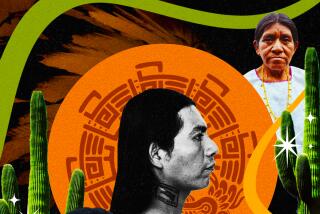Native Guarani Vies With Spanish : Paraguay’s 2 Languages Source of Pride, Concern
- Share via
ASUNCION, Paraguay — In Paraguay, Spanish is the crisp and officious language of typewriters, textbooks and white tablecloths. Guarani is the soft, melodious language of the earth, the hearth and the heart.
The great majority of this South American country’s 4 million people speak both languages, something that sets Paraguay apart.
“It is the only completely bilingual country in the world,” said Tadeo Zarratea, a lawyer and Guarani linguist. “This is a universal linguistic laboratory.”
In recent years, as Paraguayan linguistic specialists have begun to study the country’s bilingual system, pride in the unique phenomenon has grown. At the same time, concern over its problems and inequities has intensified.
Most Paraguayans are more comfortable with Guarani than with Spanish. Yet Spanish is the language of the colonial conquerors, of social status, educational opportunity and economic power, while Guarani is the language of the natives, of illiteracy, poverty and failure.
It has been so since the Spaniards arrived in the mid-16th Century, and it has bothered Zarratea since he was a child in a provincial Paraguayan town. Although Guarani was the first language of almost all of the town’s families, Zarratea and his brother spoke only Spanish at home.
“We were forbidden to speak Guarani,” Zarratea, 41, said in an interview. “I acquired the right to speak Guarani to my parents only at 22. Before that age, it was considered disrespectful.”
The attitude was a holdover from Spanish colonialism, he said. “The Spaniards said Guarani was a vulgar language, a language of Indians.”
When Zarratea and his brother started going to grade school, they found that they had a big advantage over the school’s other 28 pupils.
“We were monolingual in Spanish,” he said. “The other 28 were monolingual in Guarani. Naturally, we were the best students.”
The classes were taught in Spanish.
“The whole content of the school was aimed at us two and against the other 28,” he said.
A pact quickly took shape. The Zarratea boys helped the other children with their lessons. In return, “they let us play with them,” Zarratea recalled.
Second-Class Status
The Guarani taboo has faded since Zarratea’s childhood, but the native language still has not emerged from its second-class status. According to Zarratea, the educational system, and society in general, unfairly handicap Paraguayans whose mother tongue is Guarani. And they are the majority in this predominantly poor, mainly rural country.
After receiving his law degree, Zarratea went on to earn a degree in Guarani language studies. Later, he wrote Paraguay’s only novel in Guarani, and he joined a growing movement of linguistic and social activists who are working to erase taboos against the native language and press for its full equality with Spanish.
Zarratea, a quiet man with straight black hair and a gray goatee, earns his living as a lawyer but is best known as a Guarani devotee. Sipping terere , a cold herbal tea that is a Paraguayan national habit, he kept a legal client waiting one afternoon as he enthusiastically described the attributes of his second--but preferred--language.
6,000-Word Vocabulary
Guarani has a relatively small vocabulary, perhaps no more than 6,000 words. In compensation, its speech patterns are rich in metaphors, metonyms, similes and analogies.
“The language itself has poetry,” Zarratea said.
Guarani expressions tend to be more subtle, indirect and delicate than Spanish expressions.
“Guarani is more intimate, more affectionate,” Zarratea said. “In the expression of affection, it is irreplaceable for the Paraguayan.”
And Guarani is an equalizer. Spanish has two ways to say you --the formal, respectful usted and the familiar, more intimate tu . But Guarani has only a familiar form of address and nothing equivalent to the usted .
“That is why Guarani is not liked by military men, by priests, by politicians in public positions, by judges,” Zarratea said.
The reasons for Paraguay’s bilingualism go back to the Spanish conquest.
The Spaniards found no gold in Paraguay, only fertile land and Indians. Historians say that because most of the colonizers were young, single farmers, they used Indian women both for agricultural labor and for procreation. The Spaniards imposed their colonial regime, but Guarani-speaking mothers passed their language on to their children.
Paraguay became a rural nation of mestizos , racially mixed people with a predominant Spanish culture but an enduring native tongue.
Credit to Jesuits
For more than a century and a half, Jesuit missionaries in Paraguay organized large segments of the Indian population into a strict and rigid theocracy. The 30 Jesuit missions, called reducciones , or “reductions,” have been criticized for subjecting the Indians to a paternalistic regime, breaking down the native culture and wiping out their traditional customs. But the Jesuits also are widely credited with helping to establish Paraguayan bilingualism.
While they imposed the Spanish language, the missionaries also cultivated Guarani. They learned the native language themselves, communicated in it with the Indians and put it to paper. Father Antonio Ruiz de Montoya, a Jesuit priest, produced the first Guarani dictionary and grammar in 1624.
Situated in the heart of the vast South American continent, Paraguay has been remote and isolated since colonial times. The lack of contact with the outside has often been cited as a reinforcement for the use of Guarani.
Paraguay’s two big wars--with Brazil, Argentina and Uruguay from 1865-70 and with Bolivia from 1929-35--are said to have strengthened the bilingual system. During the wars, Guarani was used as a code language at the battlefront and as a symbol of national unity.
Alfredo Stroessner, a hero of the war with Bolivia, rose to power in a 1954 coup and remains Paraguay’s dictatorial president. The son of a German immigrant father and Paraguayan mother, Stroessner speaks Guarani, as do more than 90% of all Paraguayans.
Grazziella Corvalan, a sociologist who does research in linguistics, said that Stroessner has done much to promote Guarani as an emblem of Paraguayan nationalism.
“He is very nationalistic, very positive for Guarani,” she said.
Listed in Constitution
Article 5 of Stroessner’s 1967 constitution declares that “the national languages of the republic are Spanish and Guarani,” although it designates only Spanish for official use.
The Stroessner government also has established a national Secretariat of Guarani Language and Culture and a degree in Guarani language studies at the National University of Asuncion. Since last year, all Paraguayan high school students are required to take two hours of Guarani language a week.
Yet the Paraguayan educational system still does little for the Guarani language or those who speak it, according to Corvalan and other language scholars.
A U.S.-designed program that incorporates some Guarani into teaching programs is as controversial in Paraguay as similar “bilingual education” programs are in the United States.
The Paraguayan program, started in the early 1970s with financing from the U.S. Agency for International Development, is aimed at preparing teachers to use Guarani as a tool for helping pupils who do not understand Spanish well. Corvalan said the program’s objective is to make those who speak Guarani literate in Spanish.
Literate in Both Tongues
She argued that, for Paraguay, the goal should be to make all pupils literate in both Guarani and Spanish, starting with their mother tongue.
“Clearly, the bilingual education program has no systematic content for maintaining and enriching Guarani,” Corvalan wrote in an analysis of the U.S. program.
“Methodology-wise, it is a disaster,” she said in an interview.
Natalia Canese, another Guarani scholar, said that even though 60% of all Paraguayan children start school speaking only Guarani, there is little hope for changing the elementary school system to provide basic instruction in their language.
“It is a political problem,” Canese said. If all Paraguayans have equal opportunities for full literacy and education, “it won’t be so easy to govern them, will it?”
Dropout and failure rates in Paraguayan schools are extremely high among pupils who began classes knowing only Guarani. Partly as a result, an estimated 40% of the population is illiterate.
“That is Paraguay’s greatest problem,” Canese said. “That 40% has no access to justice or education or the communications media.”
More to Read
Sign up for Essential California
The most important California stories and recommendations in your inbox every morning.
You may occasionally receive promotional content from the Los Angeles Times.










